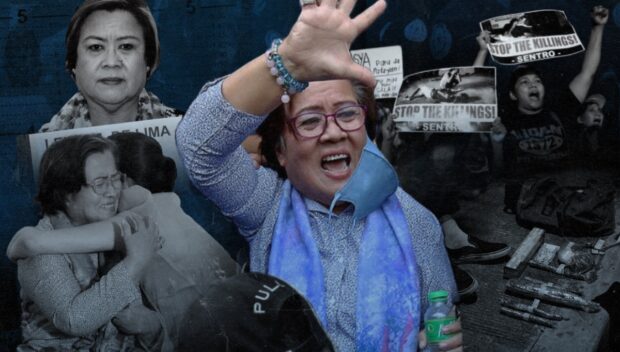From justice chief to detention to freedom: How De Lima sees PH justice system

LEILA DE LIMA COMPOSITE IMAGE BY DANIELLA MARIE AGACER FROM INQUIRER AND AFP PHOTOS
MANILA, Philippines — It was in 2010, during the time of late President Benigno “Noynoy” Aquino III, when then human rights commission chairwoman Leila de Lima accepted the challenge to head the Department of Justice.
De Lima, a lawyer, once said that being at the helm of the justice department was “both a blessing and a curse.”
“It is a curse, so to speak, because, by the very nature of this job, performing it means that there will always be a ‘losing’ party and, hence, someone will always feel aggrieved,” De Lima said in 2014 during her confirmation hearing before the Commission on Appointments for her post as justice chief.
Three years after delivering the aforementioned line, De Lima, who had transitioned from being justice secretary to being a senator, found herself being the ‘losing’ party in the country’s justice system.
She was arrested in 2017 over drug-related charges — accusations that De Lima believed to have stemmed from her being one of the staunchest critics of then President Rodrigo Duterte.
Article continues after this advertisementIt took nearly seven years of detention, two acquittals, and one granted bail petition for De Lima to be free again.
Article continues after this advertisementREAD: After 6 years, De Lima free as court okays bail
With her now are renewed reflections on the state of the country’s justice system — as someone who was once in charge of upholding the rule of law, and as someone who believes the justice system was used against her.
Used, manipulated justice system
De Lima, who once headed the Senate Committee on Justice and human rights during her stint as a senator, said it was “doubly tough and painful” to see the system “manipulated,” especially as a former Department of Justice chief herself.
“It was doubly tough and painful for me to see the justice system being used, being manipulated, just to fulfill the whims of one vindictive person,” De Lima said in an interview with INQside Look on Nov. 17, days after her release from detention.
“It was painful because I was really working hard in terms of really making our justice system work when I was justice secretary. That is precisely also always the aspiration and aim of every new justice secretary: how the justice system would work better and more effectively and fairly,” she added.
What should the justice system look like? In De Lima’s eyes, the dispensation of justice should be fair, without fear or favor.
“And now, I found myself to be the very victim of the opposite of the workings of the justice system,” De Lima said.
Up to now, De Lima believes that there was one person behind her persecution: former President Duterte.
Duterte has refused to comment on the Muntinlupa City Regional Trial Court Branch 206’s granting of bail for De Lima, saying he would not question the wisdom of the court.
Flawed justice system?
The main problem in the country’s justice system, according to De Lima, is the execution of the law.
“Insofar as the judiciary is concerned, it’s always about the execution of their very mandate of delivering justice fairly without fear or favor,” De Lima said.
According to De Lima, what gives the judiciary legitimacy is its independence, adding that as the judiciary’s independence is maintained and respected, it can be expected to perform its mandate well.
“I feel that because of that respect for independence… this new handling judge is also able to fulfill its mandate properly as would be expected,” De Lima said.
ICC and independent justice system
Some lawmakers and government officials, particularly Senator Imee Marcos, have said that the grant of bail to De Lima proves there is no need for the International Criminal Court (ICC) to meddle with the Philippines’ justice system.
The ICC is investigating the Duterte administration’s bloody war on drugs—a move frowned upon by the current administration of President Ferdinand “Bongbong” Marcos Jr.
However, according to De Lima, the “realities” in her legal case are different from those of the ICC. For De Lima, the Marcos administration should allow the ICC to investigate.
“Perhaps there are other cases where we can say that the justice system is working, although in many other cases, I don’t think we can ever say that,” De Lima said.
“We cannot blame the ICC for interfering because they do not see that there is a working system, domestic mechanism of accountability insofar as the cases of the killings under Duterte’s war on drugs,” she added.
No higher-level officials “behind the killings” have been investigated about the drug war killings, according to De Lima.
“It’s all about justice. Until when will the families of drug war victims wait? We don’t see any movement about holding responsible or accountable those with the highest responsibility for those crimes,” De Lima said.
READ: Leila de Lima after six years in prison
Hopeful
“Even with that reality, I never lost hope that it will be through the same justice system that I will be freed and vindicated,” De Lima said.
“And that’s why we had to bear with all of these. We have to go through all this ordeal, no matter how painstaking it is,” she added.
De Lima believes the very same justice system that put her in detention would also “redeem” her in her remaining legal case.
Who is Leila de Lima after detention?
“It’s still Leila de Lima… No holds barred in expressing her thoughts, in calling out various injustices and abuses of powers that be,” De Lima said.
“My courage and determination is still there. I can even say that I remained strong… even stronger,” she added.